Gnomedex 2006 and My Corporate Blogging Adventure
I visit Seattle for the second time in 2006, for Gnomedex; also, I co-found another workgroup and company, this time based on the term 'Media 2.0'.
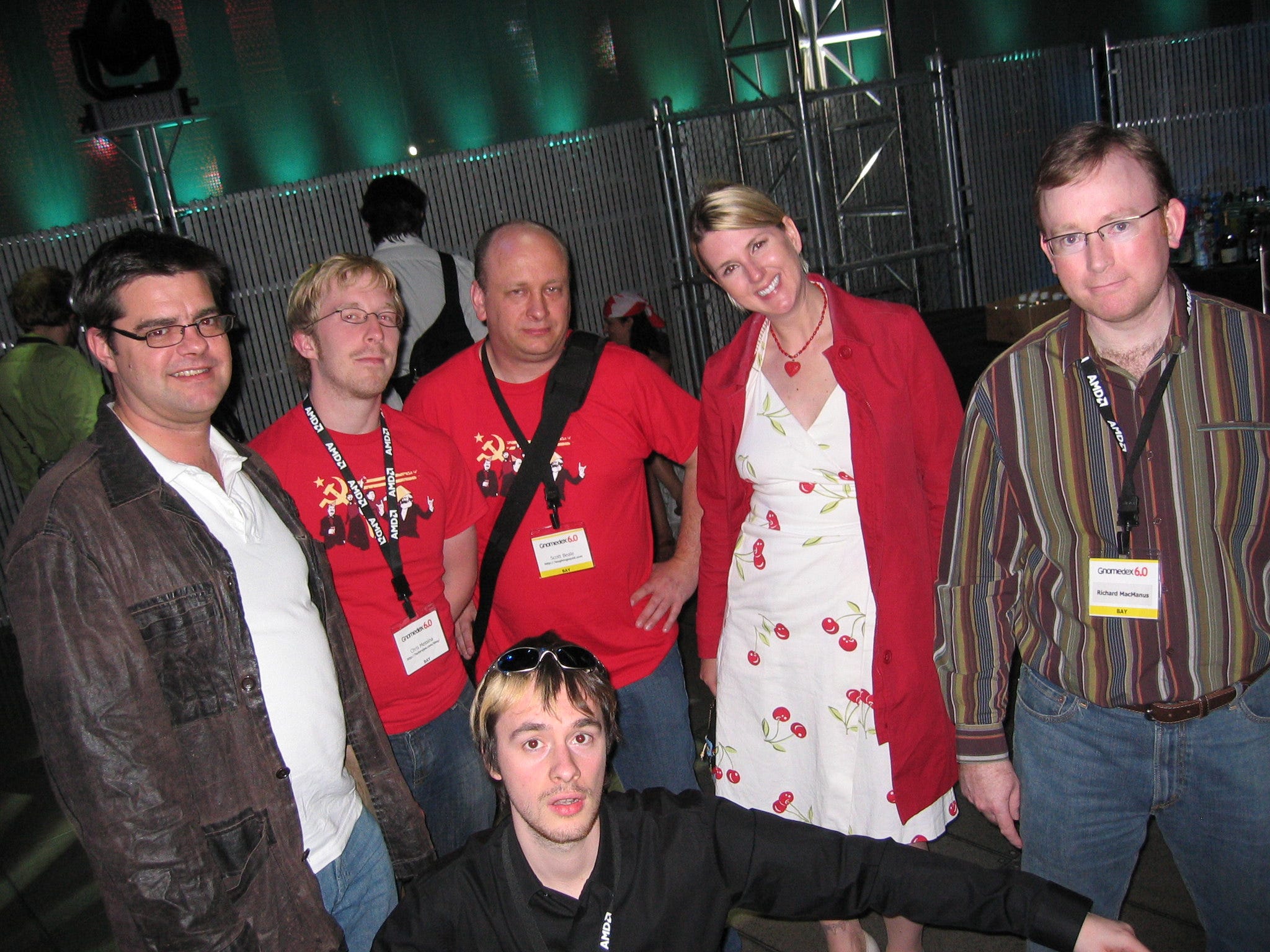
At the end of June, 2006, I boarded a flight to Seattle for Chris Pirillo’s Gnomedex conference. For the second time, I got lucky with the weather in Seattle—it was the middle of summer and gloriously sunny. The event was being held at the Bell Harbor Convention Center, right on the waterfront, and I was staying at a nearby hotel.
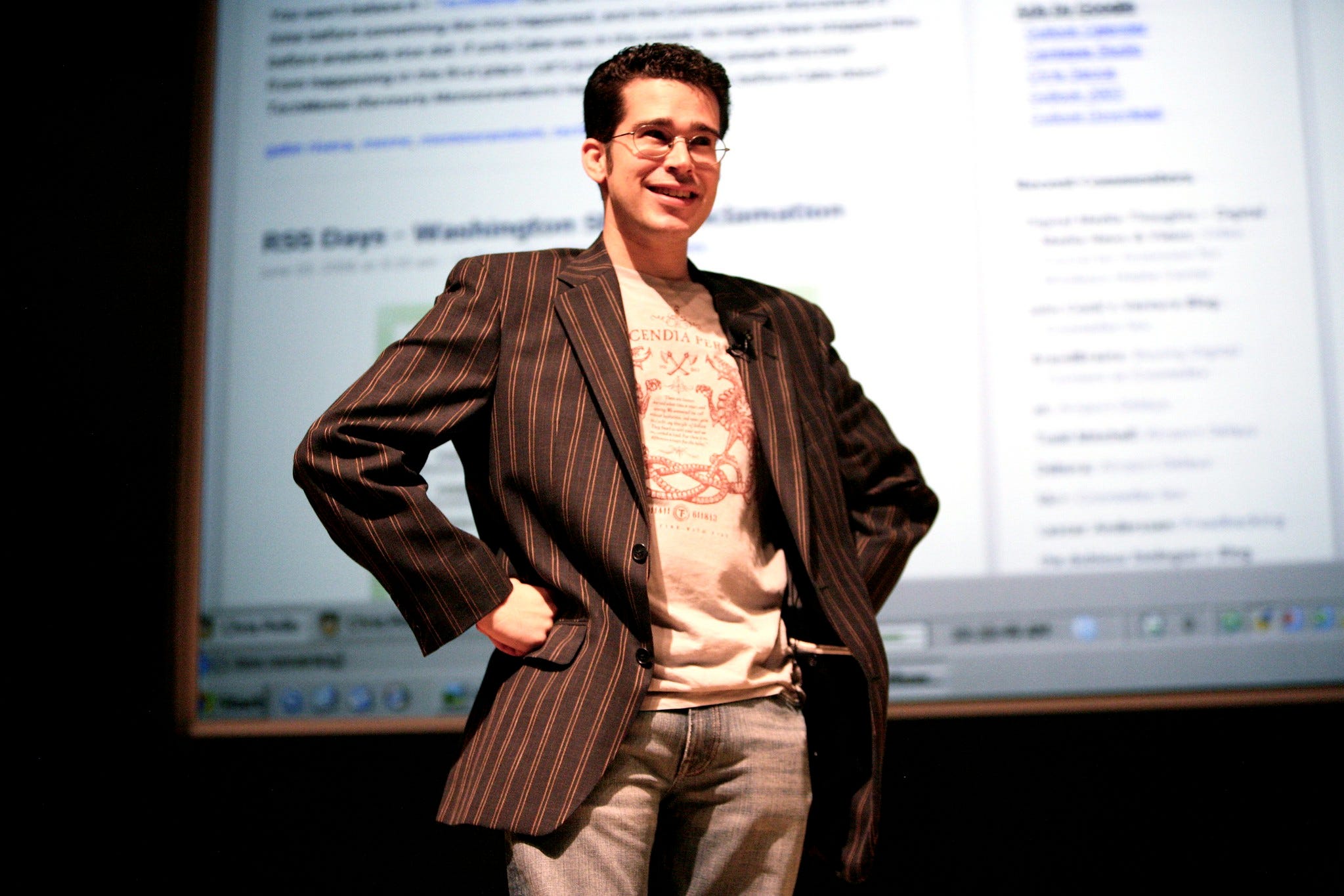
Gnomedex founder and MC Chris Pirillo; photo by Kris Krüg
Gnomedex turned out to be the most fun conference I’d attended yet, mainly due to Pirillo’s hosting skill. He was a human ball of energy, which rubbed off on everyone who attended. The content was eclectic and interesting, as were the party venues—at one point I found myself in a crowded hotel room at an after-hours party, singing “O Canada!” for reasons I don’t recall.
The other tech conferences I’d attended over the past year were straightlaced in comparison. For instance at Gnomedex, Susan Mernit—for whom I’d done freelance work before she went full-time at Yahoo—did a talk about sex and relationships. If it had been any other conference, her talk would’ve been about widgets and microformats. There were some nice event touches, too; a room was set up for football fans to hang out and watch the World Cup quarter finals, which I did.
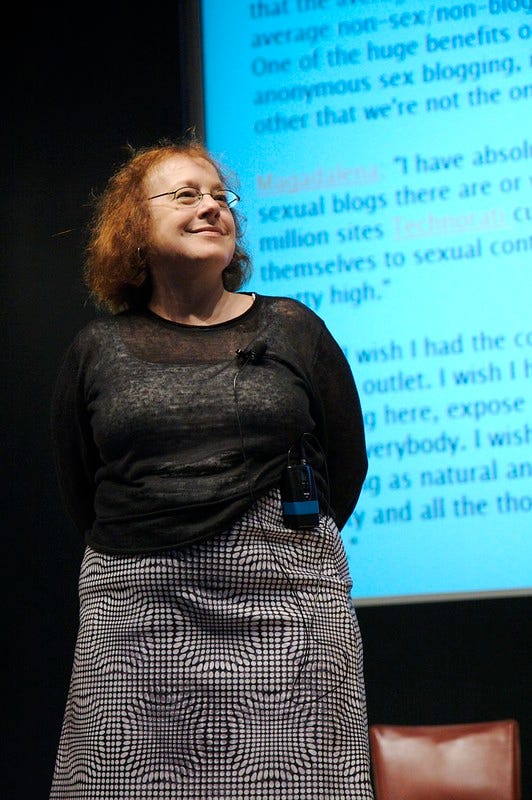
Susan Mernit at Gnomedex; photo by Ted Leung
Another Gnomedex session that stood out for me was run by Ethan Kaplan, who worked in the technology division at Warner Bros Records. Onstage with him was Dave Dederer, a founding member of the rock band the Presidents of the United States of America (most known for their 1995 hit single, “Lump”). The session opened with Dederer singing two songs from my favorite band, the Velvet Underground: “We’re Gonna Have a Real Good Time Together” and “I’m Waiting for the Man.” Then the pair discussed the music industry on the web. Dederer was in his early forties and had left his group a couple of years earlier, but he was clearly ahead of the curve—he said that online music was at 1 percent of its potential, but that it already made up half of the Presidents’ revenue.
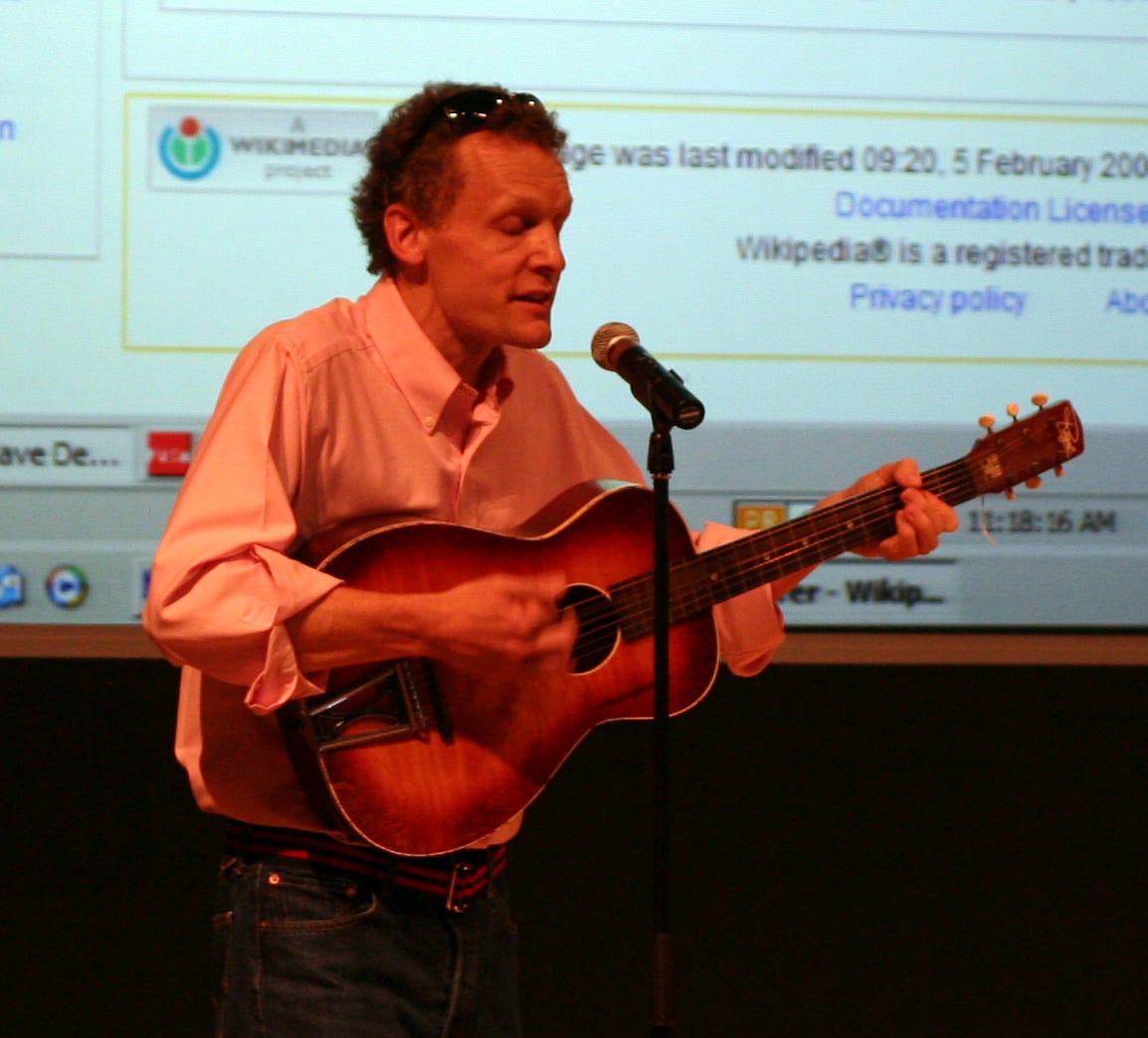
Dave Dederer from the band the Presidents of the United States of America; photo by Niall Kennedy
On Friday, I took a break from Gnomedex festivities to attend a dinner organized by the Yahoo! Publisher Network at Tulio on Fifth Avenue. It was pitched to me as “an intimate gathering of some fellow Yahoo’s and industry thought leaders (like yourself) to break bread and discuss the state of technology and the Internet.” It was, however, forgettable, in part because I no longer had any career ambitions with the company. Back in March, I’d flown to Sydney to interview for a job at Yahoo!7, a joint company formed by Yahoo and an Australian media network called Seven. The job title was Consumer Insights Manager, but it turned out they weren’t very interested in the insights part. In the rejection email, I was told I had “a very strong background and incredible mind,” but that two other candidates had “a better personality match for the role.” Once again, my introversion and social awkwardness had killed off a career opportunity. Fortunately, those were two aspects of my personality that I could effectively hide—or overcome through the written word—on my blog and in the virtual consulting work I did. My meeting with Ben Horowitz and Caterina Fake at Supernova had further disabused me of the notion that I had a special relationship with Yahoo. The company just wanted me to blog about their latest news. This helped me realize, once and for all, that Read/WriteWeb was my key asset going forward—and that I needed to spend more time on it, rather than try and land a nine-to-five job.
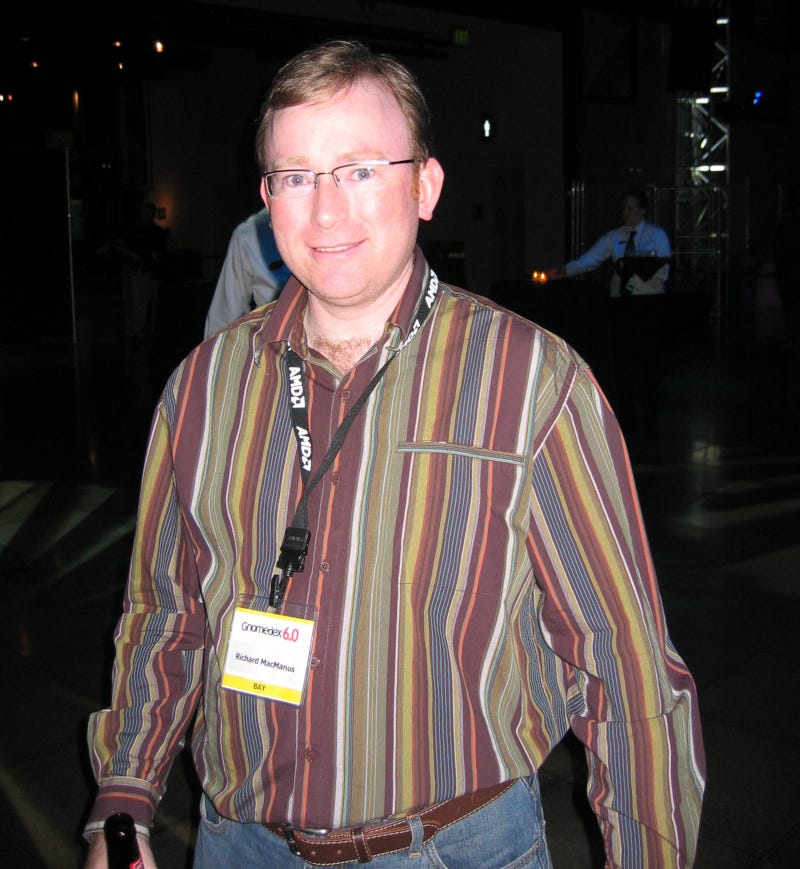
Me at Gnomedex, 2 July 2006; photo by Ben Metcalfe
My notebooks from this time are full of plans for Read/WriteWeb—my goal now was to turn it into “a blog that makes me self-sufficient,” which meant earning at least $6,000 per month. Once I’d achieved that, I noted, I would decrease or even drop my consulting work and other blogging jobs.
Part of my renewed strategy for RWW was to increase my daily content, “using shorter, more easily consumable posts,” and to “build community” by interacting with readers in the comments. There was definitely momentum with RWW by this point, however I still wasn’t all-in on it. I had one other external project on the go at this time, and it demanded a decent chunk of my time.
It was a comment left on my blog at the beginning of 2006 that led me to cofound a new company. It was from a guy named Michael Bayler, who was based in London and ran a blog called The Rights Marketing Company. It had post titles like “Media strategy predictions for 2006” and “Music Industry 2.0—read this and understand.” The content piqued my interest, so I replied to the email notification, and soon Michael and I were chatting about business opportunities.
During a phone call a couple of weeks later, I learned that Michael was a marketing specialist who’d worked for the music industry in the 1980s. He was a confident and personable man who called me “mate” and peppered his conversation with phrases like “digital disruption,” “brand strategy” and “consumer culture.” He said he was keen to partner with me, given my status in the increasingly popular Web 2.0 world.
Michael was very persuasive, as all the best marketers are, and he quickly convinced me that his insider knowledge of the media and entertainment industries would be useful to me. He suggested we start something new that bridged our two worlds. I was looking for more income, and I also wanted to find a way into the traditional media industry. Susan Mernit had been hiring me to write market analysis reports for the likes of Hearst and TV Guide. I enjoyed that work, but it was irregular and I wanted to have more exposure to big media companies.
What Michael had in mind was a new consultancy project called the Media 2.0 Workgroup, an obvious copy of the Web 2.0 Workgroup I’d founded with Mike Arrington and Fred Oliveira. Michael had written a “draft mandate” for this new group, which aimed to provide insights about the new internet landscape to media owners, rights owners, and marketers. On our phone call he talked about the group becoming “enablers for big companies in advanced media” and said we would articulate the “new consumer experience.” He mentioned that British Telecom (BT) and Microsoft’s UK branch were already interested in signing up, adding that clients like this need guidance on how to invest in technology-enabled media.
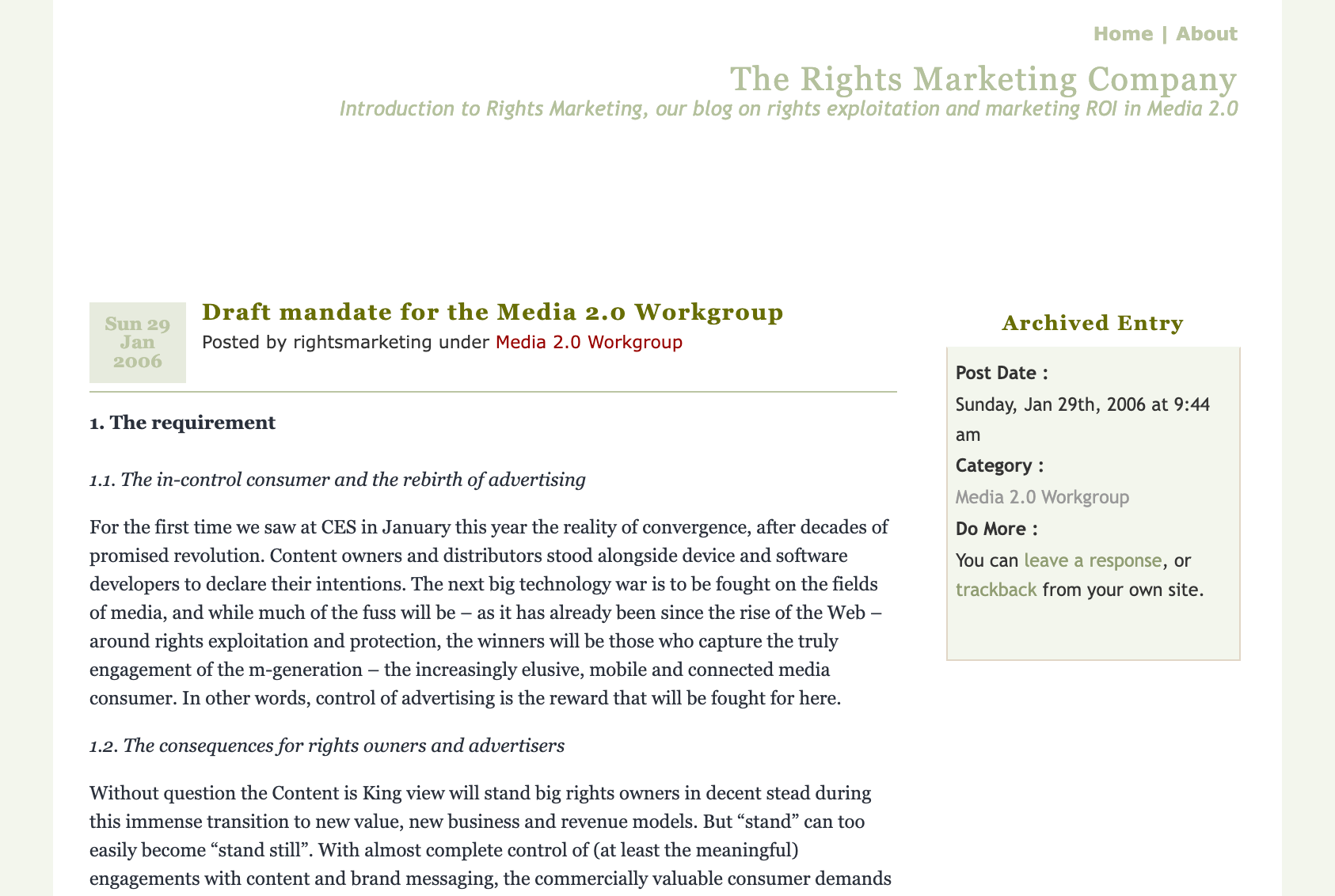
Media 2.0 Workgroup draft mandate.
I was impressed that the Media 2.0 Workgroup was more formal and structured than its Web 2.0 counterpart—indeed, it actually had a business plan. I emailed Mike and Fred to let them know about it and that I planned to join the new group. Neither was interested, so I continued the discussions with Michael on my own. He introduced me to his business partner at Rights Marketing, Jonathan Lakin, who sent me a proposed agreement at the end of March. The workgroup idea had by now turned into a new UK company, the Micro Media Corporation, which would be a sister company to Rights Marketing.
The draft agreement gave me 10 percent of the new business, with Michael and Jonathan getting 30 percent each, 20 percent to be split with contributors, and the remaining 10 percent “an allocation for other execs that may be brought in at a later point to grow the business.” I’d also be paid a monthly retainer of $3,750 after the first few months (I’d receive a discounted amount to start with). The remuneration was attractive because I didn’t yet have a regular income from RWW. Combined with payments from my other blogging and consultancy work, it would take my freelance earnings well past the salary I’d been getting the previous year as a web manager.
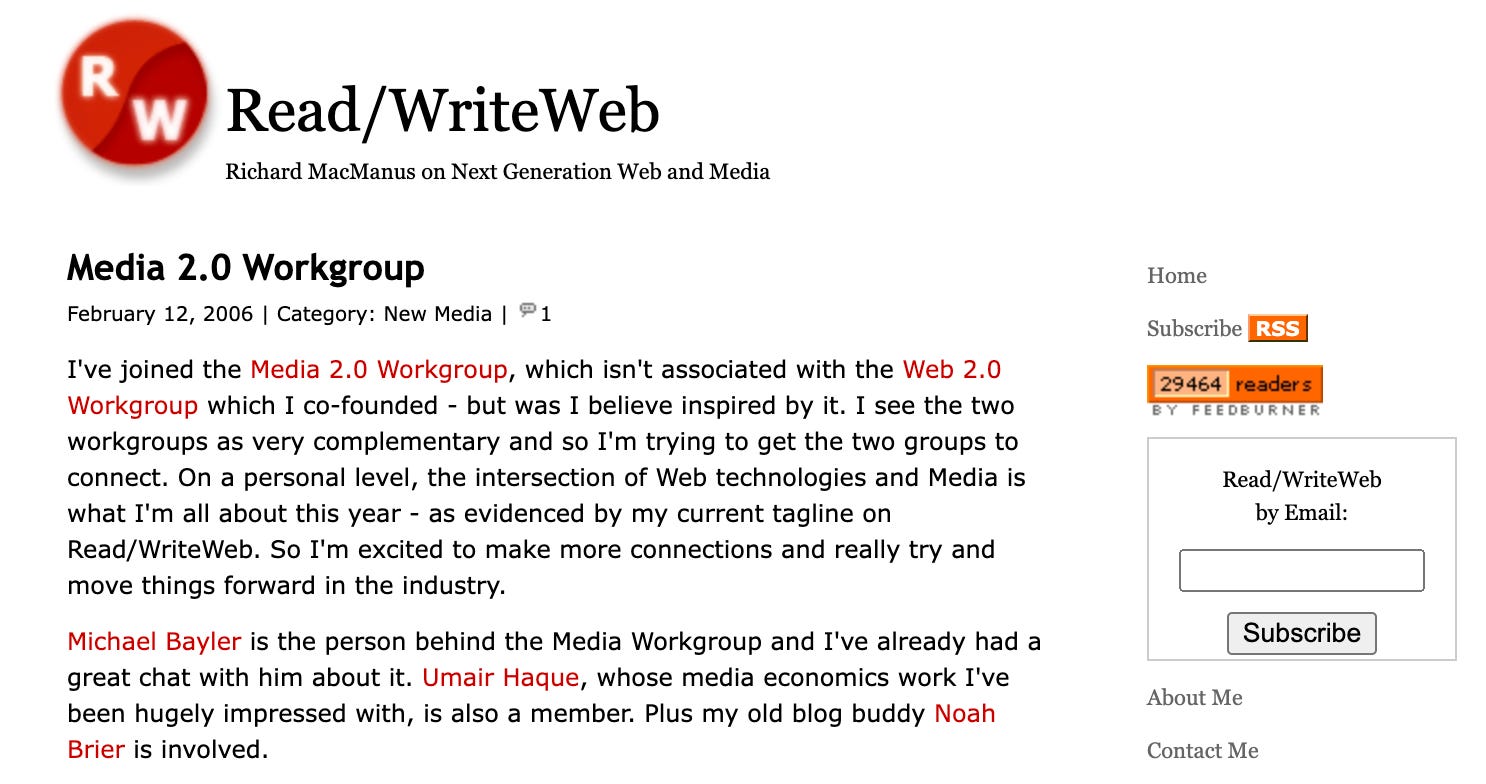
Announcement on RWW, Feb 2006
The draft contract stated that I was “expected to play a major role in the development of the business,” which I had already been doing over February and March—primarily by being the point person for new contributors. I’d emailed a bunch of people I knew from the Web 2.0 world, including Josh Porter and John Musser. I’d also blogged about it, which led to people contacting me—one of whom was Pete Cashmore, who had recently started a blog called Mashable. Pete was a Scottish guy in his early twenties, and his blog would in time become a competitor to TechCrunch. But he was just starting out in early 2006, and in one of our emails at that time he said he was “working as a consultant right now, specializing in peer production and social software.” Clearly, it was early days for him, too, in gaining advertisers for his blog.
Michael and Jonathan had initially called the product that we’d be producing IntraCast, a portmanteau of the words intranet (an internal company website) and podcast. But sometime during April that was changed to TransMission. Corporate subscriptions for this product, which was being marketed as “multi-channel leadership programs in Web and Media 2.0,” would start at £2,500 per month. Other than that, I didn’t know the specifics of how they were trying to sell this to companies like BT. I didn’t need to know, as it was their job to sell this program; my responsibility was content and getting contributors.
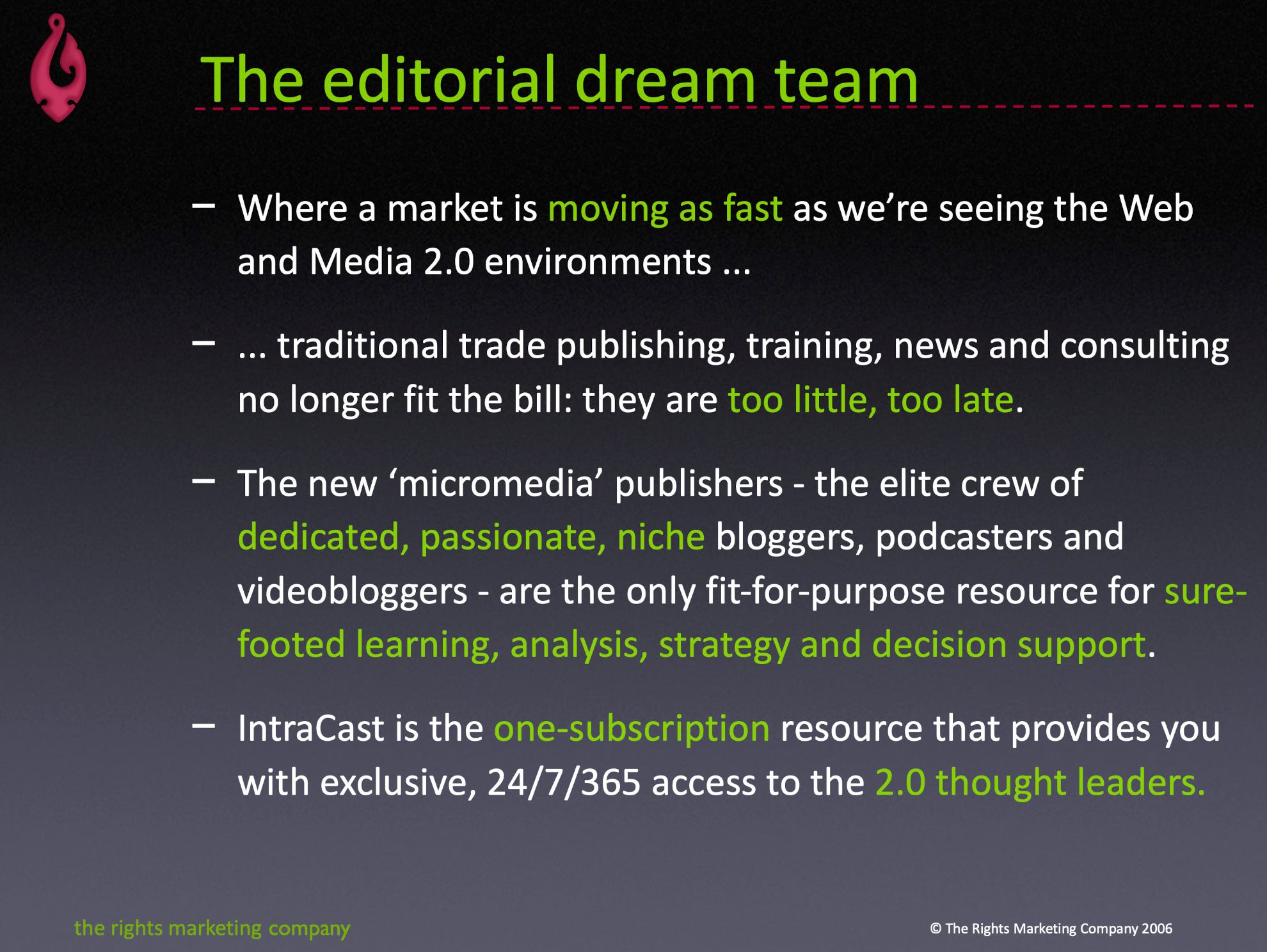
An early draft of the IntraCast product, by Michael Bayler; Feb 2006
During April I planned the schedule for the Breakfast Bulletin, a daily blog and podcast to be published early morning UK time (evening for me). We’d do three bulletins per week at first. I was already working every night, and this schedule would exacerbate that. Effectively I would be the managing editor for the bulletin, pulling in blog and podcast contributions about the day’s theme. The freelancers were being paid $90 per contribution; not bad, bearing in mind that very few bloggers got paid for their work in that era.
We did a few trials runs in April. I’d not done much podcasting before, so my first audio contributions were full of ums and ahs—Michael surprised me by sending back an edited version with those tics taken out. The final trial run was on the topic of “marketers are into YouTube,” which got an enthusiastic response from the contributors. Style and length of contribution varied greatly, but I was a good editor and so I was able to make it work. We decided to make this the launch bulletin for BT, currently the only client, which we did on Monday, April 24.
Micro Media Corp ended up being a good source of monthly income for me over 2006, but it soon became clear that nobody other than BT was subscribing to it. Despite the talk of selling the product into various corporations, there was only ever that single client. I blogged about it on RWW in June, which brought in some leads. In September I posted an example of a bulletin on RWW and again put the call out: “If your organization is looking for regular thought leadership in the Web 2.0 and New Media world, email me and I’ll send you subscription details.”
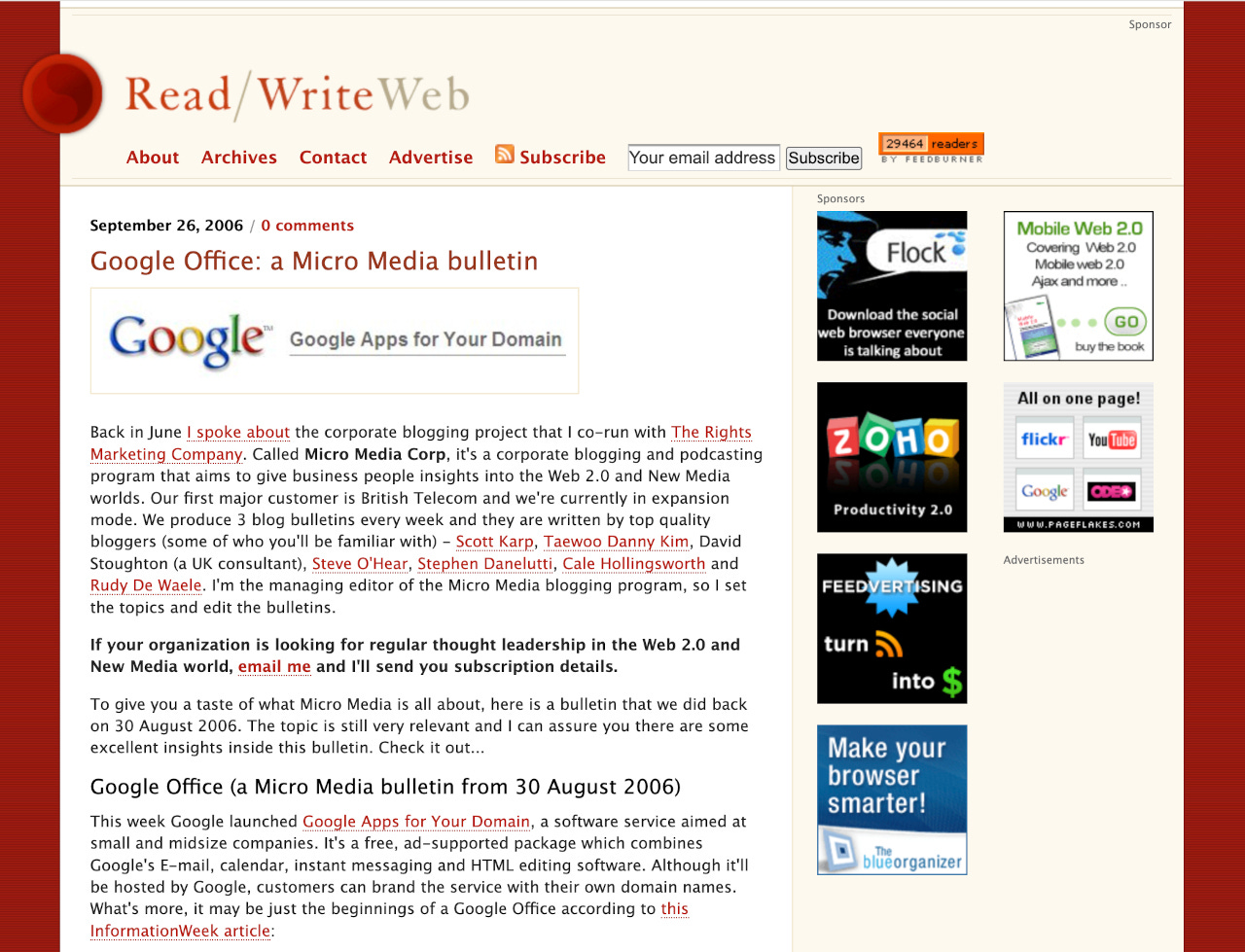
Promoting Micro Media Corp in RWW, Sep 06
But it wasn’t my job to bring in corporate clients, so I was becoming frustrated with the lack of growth. Also, sometime in September 2006, I stopped hearing from Michael Bayler. My point person at Rights Marketing was now Jane Gough, who was a friendly and organized project manager. Michael had seemingly lost interest in Micro Media Corp, although I never found out why. Jane remained my main contact for the rest of the year.
BT’s contract came up for renewal in March 2007, and so Micro Media Corp petered out with a whimper. It took me a further year to get my final payment from Rights Marketing—I was told finances had dried up. Ultimately, my 10 percent interest in Micro Media Corp led to nothing.
So, corporate blogging didn’t work out for me. Fortunately, though, Read/WriteWeb was going from strength to strength.
Lead image: At Gnomedex, 2 July 2006. From left to right: Alex Barnett, Chris Messina, Scott Beale, Tara Hunt, me, Ben Metcalfe (in front). Photo by Ben Metcalfe.
This post is part of my serialized book, Bubble Blog: From Outsider to Insider in Silicon Valley’s Web 2.0 Revolution. View table of contents.
Next up: 018. The Birth of Cloud Computing and Team RWW
You're reading Cybercultural, an internet history newsletter. Subscribe for free, or purchase a premium subscription. Your support for this indie publication would be greatly appreciated.